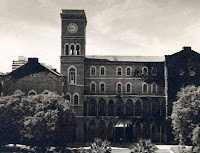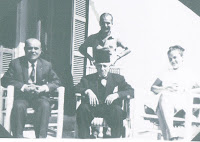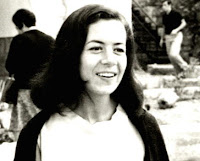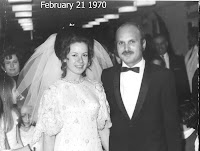AN
EXPLOSION THAT ROCKED
In the
olden days, and before portable clocks and watches were invented, time of the
day could only be observed through a main clock usually erected in the town
center on top of a tower for all to see. The time for each
clock was reset daily as per the
position of the sun on that particular day for that particular town. 12:00 for
high-noon. High-noon is that time of the day when the shade of a stick, planted
vertically in the ground, reaches its smallest length. A very simple benchmark
to determine high-noon for any location anywhere. That was before radios were
common and international time zones were introduced.
So every
town was its own time zone. An island unto itself. One could know the time of
the day only by looking at the clock tower when it was within sight or by
hearing it's chimes at the top of the hour, when out of site. Clocks and their towers became a
familiar, common, everyday feature of the town and a center of attention and
attraction for the town dwellers. Builders
and clockmakers would lavish the utmost of their craftsmanship to turn
their clock and it's tower into an icon worthy of their city.
That's what College Hall Tower Clock
was to Ras Beirut.
 I remember
myself as a young child walking with my grandfather (Jiddi Abou Yousif) on
Bliss street in the direction towards
the University. As soon as the College Hall tower clock came to sight, Jiddi
would take out his pocket watch with its beautiful gold chain from his vest
pocket, look up at the tower clock, set his watch to it and place it back in
his pocket with the satisfaction that it was now in accord with the clock of
the greatest institution of learning in the world . He was on the top of the
hour of the world.
I remember
myself as a young child walking with my grandfather (Jiddi Abou Yousif) on
Bliss street in the direction towards
the University. As soon as the College Hall tower clock came to sight, Jiddi
would take out his pocket watch with its beautiful gold chain from his vest
pocket, look up at the tower clock, set his watch to it and place it back in
his pocket with the satisfaction that it was now in accord with the clock of
the greatest institution of learning in the world . He was on the top of the
hour of the world.
Later, as a
young man, and from the same location, I would look up to the right and there
was the clock, urging me to quicken my steps through the Main Gate to get on
time to the the lower campus before the
start of the class session.
During our
class sessions, we could always count on the
ten to the hour sound of its bell
urging an over zealous teacher to give us a break and let us out at last.
When we sat
in the Green Field Grandstand cheering our home team, the clock was always up
there, in full view, to fan the flame of loyalty to our Alma Mater.
Walking on
the Beirut Cornish on a sunny day, I would look up and there was the clock, on
top of a green hill, towering against
the blue sky, surrounded by some strands of white clouds, added as a final
touch-up to a master painting by a Master Painter
Later, I
joined AUB in February 1991as Director
of Physical Plant. Lived in my own house on the Manara area for two years then
moved to live on campus in a beautiful house that was later demolished to make
way for the present Charles Hostler Student
Center.
The position I held provided me with the privilege of having
College Hall clock placed in my custody.
She was now my baby.
With the
memory of my grandfather's faith in the tower clock still vivid in my mind, I
took it upon myself to see to it that it was still worthy of his confidence. So
every Monday morning I would set my wristwatch to the BBC time signal at six
o'clock. Then on my way to the office, I would first go to the upper floor of
College Hall, climb the wooden ladder to the top of the tower and reset the
clock accordingly.
At six
o'clock on the morning of Friday November 8, 1991, I woke up and turned on the
radio to listen to the BBC news, as was my habit, before I start my day.
Somewhere along the way, the newscaster interrupted himself to announce a statement in a single sentence. "An
explosion has rocked the main administration building of the American
University of Beirut," and went on with whatever piece of news he had interrupted.
.........
........
Did I
really hear what I just heard?
Living in
the Manara area we should have heard the explosion, and we heard nothing
Did he say
specifically the American University of Beirut?
What did he
mean by "the main administration building?"
Could that
be .... College Hall.
How ironic
that, as custodian of the University buildings, living a mere five minutes walk
away, to be informed of this devastating piece of news from a source as far
away as London.
So,
hurriedly, and without going through my morning ritual of shower and coffee,
put on my clothes, got on Bliss street and started heading for the Main Gate.
Brisk steps at first.
As I was
getting nearer and nearer, my pace slowed down and my heart started pounding,
at the realization of what could be waiting for me.
My eyes would
refuse to look up afraid of what I might see, or actually what I might not see.
When I
reached the Jean D'Ark junction, my habitual vantage point, I gathered all the
courage and looked up ....









.JPG)


























